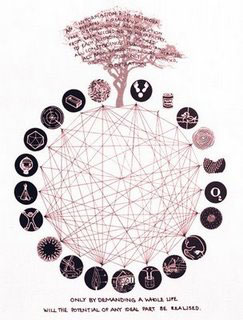
| HOME |
| NERVE |
| REVIEWS |
| ARCHIVE |
| EVENTS |
| LINKS |
| ABOUT US |
| CONTRIBUTORS |
| BACK ISSUES |
| CONTACT US |
 Climate
for Change
Climate
for Change
FACT Centre, Wood Street (13th March - 31st May 2009)
Reviewed by Adam Ford
Over the past year or so, as the global credit crunch has turned to recession and inevitable depression, the idea that the current way of organising society is unsustainable has become almost commonplace.
In the United States, a relatively unknown Chicago politician has risen to the presidency, basing his whole campaign on the vague buzzword of 'change'. As each day passes, it is becoming clearer that this was just as cynical as any other marketing technique. However, it inspired many millions to fanatically support him, and this illustrates a hunger for different ways of doing things. Those in power might be unable and unwilling to keep up, but FACT has plugged into this mood, with a thought-provoking exhibition and series of events.
The enormity of the economic crisis dominates the upstairs Gallery 2, in the shape of Melanie Gilligan’s short film ‘Crisis in the Credit System’. This is the first artwork I’ve seen that registers the sheer panic of the current situation. The shredding of old ideas about how financial markets and economies work – essentially that they would go on expanding indefinitely – is realistically brought to the screen, as five bank employees describe their own personal crisis, and grasp in vain for understanding. But beyond this emotional effect and a torrent of suddenly everyday news terms like ‘fundamentals’, ‘derivatives’ and ‘volatility’, it seems Gilligan herself doesn’t understand why the bubble has burst, and she sees no way forward beyond the ‘regulations’ a character tamely proposes towards the end. Of course, she’s not exactly alone in that; none of the ‘financial wizards’ have much of a clue either.
Nik Kosmas and Daniel Keller’s ‘Forever’ rests in the opposite corner. An installation created during the last few weeks, it is a post-apocalyptic computer terminal which plays a Windows 98 screensaver ‘forever’, or at least until the electricity shuts off. It isn’t a stunning artistic achievement, but it certainly reflects soaring levels of anxiety about the years ahead.
‘New York Times – Special Edition’ is the final work on show in Gallery 2. This spoof newspaper generated thousands of real life headlines last November, one week after the election of Barack Obama, when it was distributed free of charge in Manhattan. The front page splash for July 4th 2009 is ‘Iraq War Ends’, and each of the fourteen pages is crammed with stories that American liberals would no doubt love to see. The paper is well put together and humorous, but it is also effectively dated, due to Obama’s systematic attacks on the hopes of all but the richest of those who put him in power.
Two intriguing projects are based in the Media Lounge. Designed by Danish collective N55, ‘SHOP’ is an attempt to create a moneyless economy in a world without borders, where people effectively barter with each other, offering and exchanging goods and services. The project has been running since 2002, and whilst it hasn’t brought about the end of the profit system, it has challenged beliefs in its permanence. ‘Ghana Think Tank’ also stands conventional wisdom on its head, giving majority world citizens a chance to offer advice on Western problems.
But it is Gallery 1 that will be the hub of the FACT’s extremely ambitious project. For ten weeks, it will host scores of meetings, discussions and workshops, each supposedly challenging the crisis-ridden status quo in some way, whether from an economic perspective, an environmental one, or some combination of the two. And on one wall there is a display where visitors are invited to describe how they imagine the ‘perfect’ Liverpool of 2050. Some of these imaginings are silly, such as five-person dragon rides across the Mersey, but others appear more possible, like free summer cinema screenings in Sefton Park.
Why can’t we be materially secure and have fluffy environmental niceness? Why must we live insecure, alienated lives that poison the planet?
From 8pm on 8th April in Gallery 1, I will be taking part in a discussion organised by Shift magazine. I will argue that an economically and environmentally sustainable future cannot be created within a system of rival capitalist states, and that the international working class must take control of the planet to save the human species and millions of others from catastrophe. I will also be arguing for those free summer cinema screenings in Sefton Park.
From 1pm on 26th April, the third part in a series of discussions initiated by Mute and Variant magazines questions the existing framework for independent cultural practitioners. Does commercialisation enhance or corrode 'critical' culture? Why does an institutional turn to 'openness', collaborative and politicised art practices coincide with privatisation? How will the financial crisis impact on arts funding and cultural practice and what would be a 'sustainable' alternative? With panellists: Leigh French (Variant), Anthony Davies (Writer), David Jacques (artist), Ritchie Hunter (Nerve). Chair: Josephine Berry Slater (Mute)
Click here for the Gallery 1 calendar.